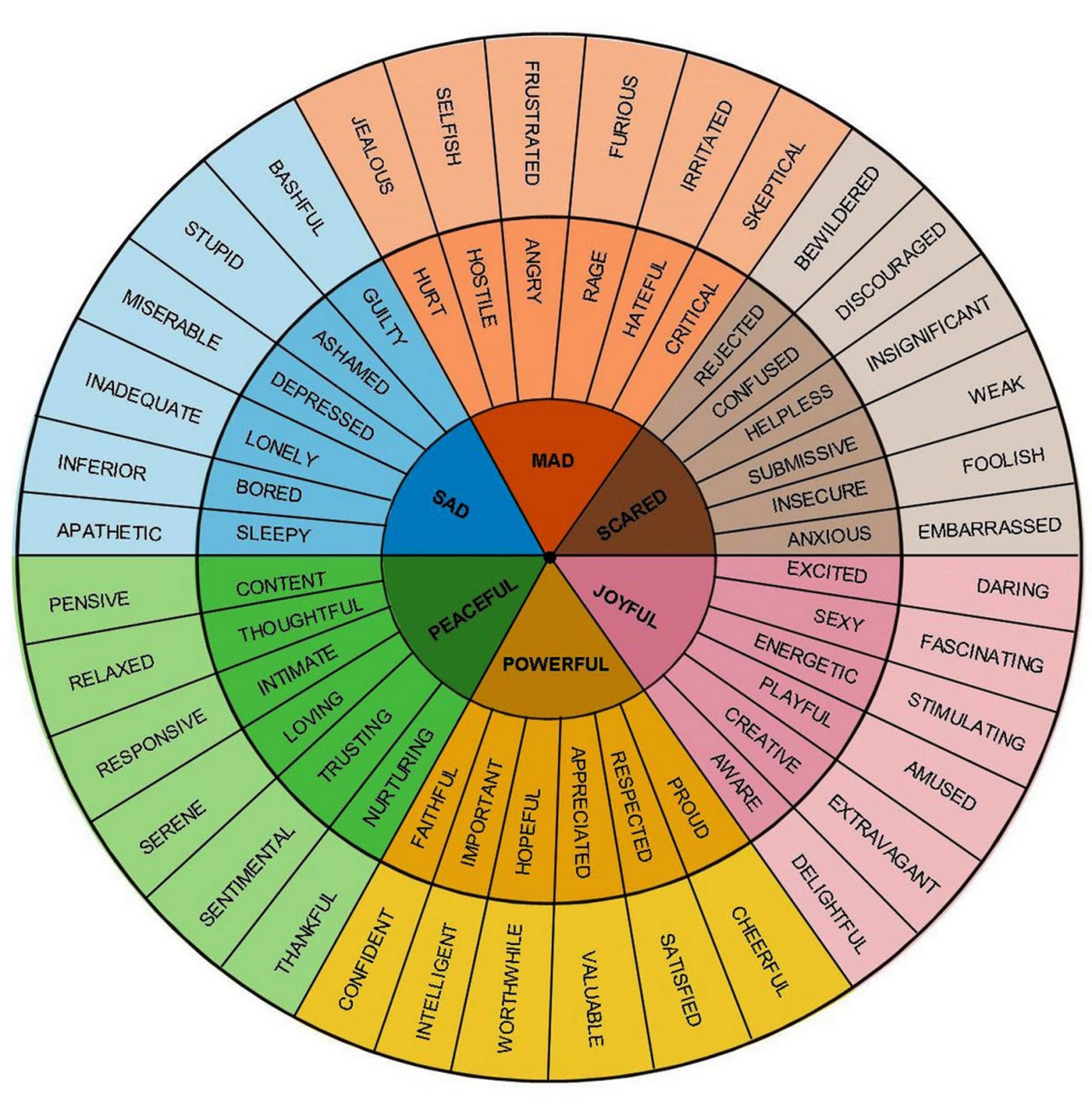Emotional intelligence term was first brought by psychologist and author Daniel Goleman in 1995. Daniel found that truly effective leaders are able to recognize, connect with, and learn from their own and other people’s mental states. EQ is a measure of a person’s level of emotional intelligence. This refers to a person’s ability to perceive, control, evaluate, and express emotions.
A week ago I had an opportunity to hear a bit more about it from Lithuanian couching and emotional intelligence expert - Vytautas Gaidamavičius. After the session Vytautas gave us a couple of homework exercises that I found quite tricky. It brought a new light to my emotional understanding, which appeared to be very limited. I was not able to identify my emotions, not to mention controlling them.

The goal of this post is to describe emotions and memorize those. I found above image very helpful and easy to follow. It’s called The Feeling Wheel. Some of the feelings seem to be obvious, but when it comes to identifying what is what, I encounter difficulties. Therefore I put basic definitions here. Some of those are just taken from English dictionary.
Peaceful
Inner band
- Content- pleased, satisfied or showing satisfaction with things as they are. Not wanting more or less, just being happy with what you have
- Thoughtful - occupied with or given to thought; contemplative; meditative; reflective:
- Intimate - deep connection with someone. Feeling of intimacy flourishes in an atmosphere of safety. People feel safe when they are with someone who is very accepting, caring and compassionate Emotional intimacy
- Loving - a variety of different feelings, states, and attitudes that ranges from interpersonal affection (“I love my mother”) to pleasure (“I loved that meal”). It can refer to an emotion of a strong attraction and personal attachment.
- Trusting - believing others will not take advantage of your openness. More
- Nurturing - to feed and protect, to support and encourage, as during the period of training or development.
Outer band
- Secure - More
- Serene - calm, peaceful,tranquil, untroubled
- Responsive - Taking time to think things through. It is being empathetic. It is being two steps ahead. You consider. You plan. You take things less personally. You are calm.Responsive vs Reactive
- Pensive - one loses oneself in a moment or thought, deeply, often wistfully or dreamily thoughtful More
- Relaxed
- Thankful
Powerful
Inner band
- Faithful - deserving trust, having or showing true and constant support or loyalty.
- Important - The Importance of Feeling Important
- Hopeful
- Appreciated
- Respected
- Proud
Outer band
- Confident - feeling or belief that you can do something well or succeed at something.
- Intelligent - able to see and understand people, things, or situations clearly and intelligently.
- Worthwhile - assessments of our self-worth, our value, our acceptability. What makes you worthwhile
- Valuable - What determines your personal value
- Satisfied
- Cheerful - Some reasons to be cheerful :)
Joyful
Inner band
- Aware
- Creative
- Playful
- Energetic
- Sexy
- Excited
Outer band
- Extravagant - lacking restraint in spending money or using resources
- Delightful
- Amused - to occupy the attention with something pleasant
- Stimulating - encouraging or arousing interest or enthusiasm.
- Fascinating
- Daring - willing to take or seek out risks; bold and venturesome
Scared
Inner band
- Submissive
- Anxious
- Insecure
- Helpless
- Confused
- Rejected
Outer band
- Embarrassed
- Foolish
- Weak
- Insignificant
- Discouraged
- Bewildered - confused and indecisive; puzzled
Mad
Inner band
- Critical
- Hateful
- Rage
- Angry
- Hostile - showing or feeling opposition or dislike, unfriendly.
- Hurt
Outer band
- Jealous
- Selfish
- Frustrated
- Furious
- Irritated
- Skeptical
Sad
Inner band
- Guilty
- Ashamed
- Depressed
- Lonely
- Bored
- Sleepy
Outer band
- Bashful - reluctant to draw attention to oneself; shy
- Stupid
- Miserable
- Inadequate
- Inferior - a person lower than another in rank, status, or ability
- Apathetic -showing or feeling no interest, enthusiasm, or concern
